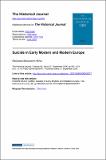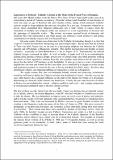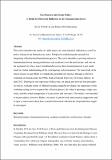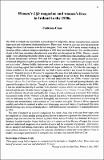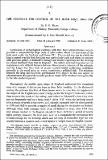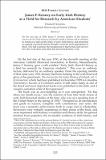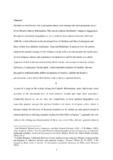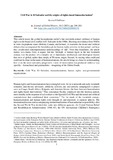Search
Now showing items 41-50 of 51
Suicide in Early Modern and Modern Europe
(Cambridge University Press, 2006-09)
This is a review of recent English- and German-language publications on suicide, both as an act and a subject of discourse, in the early and late modern periods. It argues that, while publications on the theme have increased ...
Latecomers to reform? Catholic activism in the wake of the French wars of religion
(Studies, The Irish Jesuit Quarterly, 2017-11)
100 years after Martin Luther wrote his Ninety-Five theses, France found itself on the cusp of an extraordinary period of Catholic ascendency. From the violence and bloodshed of four decades of civil war came an age of ...
Past practice into future policy: A model for historical reflection in the humanitarian sector
(Manchester University Press, 2019-05-01)
This article describes the results of a pilot project on using historical reflection as a tool for policy-making in the humanitarian sector. It begins by establishing the rationale for integrating reflection into humanitarian ...
Woman's Life magazine and women’s lives in Ireland in the 1950s
(Irish Labour History Society, 2013)
[No abstract available]
The struggle for control of the Irish mint, 1460-c. 1506
(RIA, 1978)
Correlation of archaeological evidence with that from administrative records
provides a comparatively large body of information about the operation of the Irish mint under the Yorkists and Henry VII. This ...
James F. Kenney on early Irish history as a field of research by American students
(2015)
On the last day of 1930, James F. Kenney (author of the famous Sources for the Early History of Ireland) issued a clarion call to scholars in America to take up the study of early Irish history, and presented an agenda of ...
“So that they may be able to live and die as good Christians”: The early history of the Nom de Jésus Hospital in Catholic Reformation Paris
(DePaul University, Chicago, Illinois, 2021-11-16)
The Hôpital de Nom de Jésus was an important establishment associated with Louise de Marillac, Vincent de Paul, and their communities. The Daughters of Charity were responsible for staffing this hospital beginning in1653, ...
A spiritual inheritance? Family spirit, virtue and vocation in the Vies of the Lamoignon dévots
(Oxford University Press, 2020-08-26)
Members of the Parisian robe Lamoignon family were among the most prominent dévots of the French Catholic Reformation. This article explores the family’s religious engagement through six substantial biographies or vies ...
Civil war in El Salvador and the origins of rights-based humanitarianism
(Cambridge University Press, 2020-06-03)
This article traces the global humanitarian sector s late twentieth-century embrace of human rights to the brutal civil conflict in El Salvador in the 1980s. Drawing on evidence from NGOs in three Anglophone states (Britain, ...

